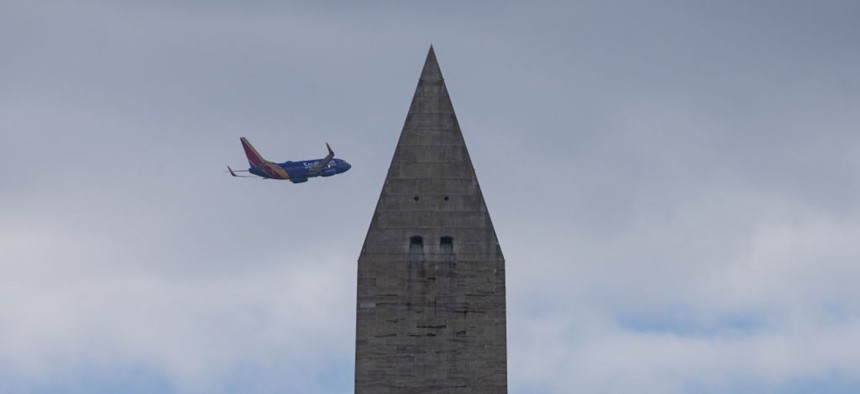DIU chooses software company for $100M aircraft monitoring tech contract

WASHINGTON D.C. , USA - DECEMBER 17: A plane flies over the Washington Monument as daily life continues in Washington D.C., United States on December 17, 2022 Photo by Celal Gunes/Anadolu Agency via Getty Images
Teleidoscope will work to apply its artificial intelligence-based system into video threads that watch for aircraft
A decades-old government system to monitor unauthorized aircraft over the U.S. capital region is about to get an AI overhaul to speed up operations.
Teleidoscope, a company out of California that specializes in automated targeting software for augmented-reality games, has won an up-to-$100 million contract to replace portions of the National Capital Region-Integrated Air Defense System, or NCR-IADS, following an 18-month prototype phase led by the Defense Innovation Unit, or DIU.
Teleidoscope founder Matt Rabinovitch said the system applies AI to full-motion-video threads to spot aircraft that aren’t operating in a safe way, then identify the type of aircraft and tell operators which way it’s heading. It also has “all kinds of image-enhancement features” such as defogging and decluttering, Rabinovitch said in an interview.
So what happens when an aircraft’s pilot doesn’t respond to radio communication?
“The first line of defense is actually that they will beam a laser at the cockpit of the aircraft to try to let the pilot know that they're entering restricted airspace and that they should turn on their comms and start communicating,” he said, adding that the laser is designed not to injure eyes. “And then pretty shortly after that, we’ll scramble fighter jets”
The original NCR-IADS system was installed after 9/11, he said, when “obviously, aircraft went places that they weren't supposed to. And so most of the focus previously had been sort of outward-facing where they had camera systems on sort of the borders of the country, but not so much on or surrounding critical infrastructure in the country.”
Watching for drones isn’t part of the current contract, but Rabinovitch said that other customers such as the Air Force are exploring how to use the system to track smaller unmanned aircraft near bases.


